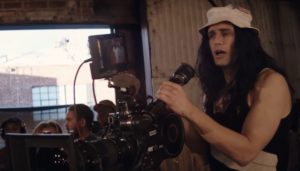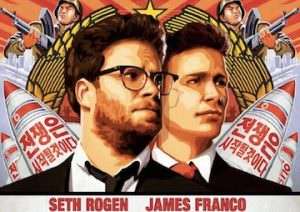The Best Movies That Won’t Win Best Picture on Oscar Night
These six films, as good as any of the top nominees, represent the politics and prejudices of Academy voters. AP Images
AP Images
The Oscars happen Sunday night. This year, the Academy of Motion Picture Arts and Sciences seems to be getting off the hook on diversity complaints with nominations of women and African-Americans. But once again, the politics and prejudices of Academy voters can be seen in what was overlooked.
These six films are as good as any nominated for best picture, but none will be be taking home a golden statue for top movie.
Directed by Ben and Josh Safdie. Written by Josh Safdie and Ronald Bronstein. Starring Robert Pattinson, Jennifer Jason Leigh and Ben Safdie.
Robert Pattinson’s Connie Nikas is a small-time hood who both cares for and exploits his mentally challenged brother Nick. After a robbery gone wrong, Connie embarks on an odyssey to get money to make bail. Imagine “Of Mice and Men” written by Elmore Leonard, directed by a “Mean Streets”-era Scorsese, and a film hyped up on Molly.
Connie is devoted to his brother, but both men are the worse for it. In his quest to free Nick, Connie morphs into a human wormhole, dragging one person after another into the ever-worsening consequences of his actions. You can see the wheels turning inside Connie’s mind as he figures out his next move. He has a strange charisma, a false layer of confidence given depth by genuine purpose. Pattinson’s performance is so compelling that he continually forces you to keep watching when you’d rather look away. His may not be the best performance of the year—then again it may be—but it’s certainly the most overlooked.
Written and directed by James Gray. Starring Charlie Hunnam, Robert Pattinson and Sienna Miller.
In 1925, Percy Fawcett, along with his son, disappeared in Brazil on a doomed expedition to find a lost city that had become a life-defining obsession for him. More than nine decades later, Fawcett’s fate would become an obsession for historians and writers, best captured by David Grann’s 2009 book, “The Lost City of Z.” The nonfiction work inspired James Gray to adapt the book for film, but his focus is on Fawcett’s motivations in search of Z, not his fate.
Gray’s films, including “Two Lovers” (2008) and “The Immigrant” (2013), are intimate studies of complex characters whose desires are in conflict with a world they can’t control. “Lost City of Z,” his most ambitious film to date, is moored by Fawcett’s unshakable belief in Z’s existence, which compels belief in others. Some cannot carry the burden of his dreams, others are drawn and share in the consequences. A lesser film would have included the usual delusional obsessive story arc, but by focusing on what inspired Fawcett to sacrifice his life in the search for a lost city, the film does not offer easy answers and leaves you with your own lingering questions that will never be answered.
Hunnam is a superb leading man, and Robert Pattinson, as a cartographer who accompanies Fawcett on all his journeys except the last, anchors the film.
Written and directed by Trey Edward Shults. Starring Joel Edgerton, Riley Keough and Christopher Abbott.
The last few years have brought a surge of well-made, low-budget horror films (“It Follows,” “The Babadook,” and “The Witch,” to name three), but “It Comes at Night,” like the Oscar-nominated “Get Out,” transcends the genre. It unsettles in places that supernatural horror can’t reach. The setup is deceptively simple: There’s been a mass epidemic, and a family of three have barricaded themselves in an unnamed wilderness. They encounter a young family with a toddler and agree to take them in.
Everything seems to work out. The days pass with a comforting lack of tension. Then there is a breach, and the possibility that the disease has entered the house gives rise to suspicions that escalate into paranoia. In a zombie movie, people stop being human when they lose their wits. In “It Comes at Night,” they lose their humanity.
Joel Edgerton is well on his way to being the Australian Orson Welles. He held his own opposite Leonardo DiCaprio in “The Great Gatsby,” mastered a Boston accent that evaded Benedict Cumberbatch in “Black Mass,” and disappeared into the role of a white Southern farmer who marries a black woman in the Oscar-nominated “Loving” (2016). He also wrote, directed and starred in “The Gift,” a taut psychological thriller. He also produced “It Comes at Night,” and the film is suffused with his remarkable ability to convey emotion and conviction without words.
Directed by Steven Soderbergh. Written by Rebecca Blunt. Starring Daniel Craig, Channing Tatum, Adam Driver, Riley Keough and many others.
How this movie was not a hit remains one of the bigger mysteries of the year. If “It Comes at Night” is deceptive in its simplicity, “Logan Lucky” is deceptive in its complexity. A West Virginia man, afraid of losing his daughter to his ex-wife, hashes out a plan to rob the Charlotte Motor Speedway. Unjustly fired from his construction job, he ropes in both his brother (Adam Driver) and sister (Riley Keough) as well as a local legendary safecracker appropriately named Joe Bang. With a cracker cadence and sly, laconic charm, this might be the best Daniel Craig has even been—certainly the most fun.
The funniest scene I saw in a movie last year involves a prison riot, where one of the prisoners’ demands is for the next George R.R. Martin book. The warden (Dwight Yoakam in a hilarious bit) tells them it hasn’t been published yet: “The TV show has gotten ahead of the books.”
Directed Michael Showalter. Written by Kumail Nanjiani and Emily V. Gordon. Starring Nanjiani, Zoe Kazan, Ray Romano and Holly Hunter.
“The Big Sick” earned an Oscar nomination for best original screenplay—rare for a comedy and even rarer for one co-written by a woman. But it deserved more. Based on the real-life courtship of Nanjiani (of “Silicon Valley”) and Gordon, this Judd Apatow-produced film could have been made into three average Hollywood films: one about a struggling stand-up comedian, the second a culture-clash comedy, and the third a romance where the female is in a coma for much of the film. For reasons I can’t fathom, the coma romance seems to be a popular 21st-century subgenre, but “The Big Sick” actually finds humor in it.
In the film, the three plot threads are tied together seamlessly. A Chicago-based Pakistani stand-up comic tries to hide his relationship with an American girl from his old-worldish parents. The film never takes the plot spins you’re expecting, and the relationship between Nanjiani and Emily’s mother, Holly Hunter (in her best role in years), typifies the film’s strength: Two people from radically different backgrounds become friends, losing their barbed edges.
“The Big Sick” is unlike any other film of the year.
Directed by James Franco. Written by Scott Neustadter. Based on the book by Greg Sestero and Tom Bissell. Starring Franco, Seth Rogen and Dave Franco.
James Franco won a Golden Globe for best actor for this and was nominated for almost every possible best-acting award except an Oscar. We all know why Franco and his film were snubbed by the Academy, getting only a nod for best adapted screenplay. But the #MeToo allegations against him have nothing to do with the quality of “The Disaster Artist.”
This is the best movie about a horrible movie since Tim Burton’s “Ed Wood.” Those who have not seen “The Room” wonder if it can really be that bad. The answer was given by Seth Rogen (who co-stars in Franco’s film) at the Golden Globes: “It is so bad that it makes you question the nature of quality.”
Franco could have gone for cheap laughs and made the entire movie at Tommy Wiseau’s expense. But making one long joke about a bad movie would have been too easy. Franco finds the pathos in a filmmaker who does not lack for passion, only talent.
Independent journalism is under threat and overshadowed by heavily funded mainstream media.
You can help level the playing field. Become a member.
Your tax-deductible contribution keeps us digging beneath the headlines to give you thought-provoking, investigative reporting and analysis that unearths what's really happening- without compromise.
Give today to support our courageous, independent journalists.




You need to be a supporter to comment.
There are currently no responses to this article.
Be the first to respond.